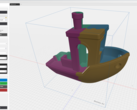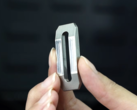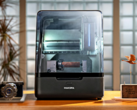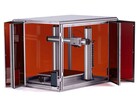
A splash of color on your desk: Reviewing the Anycubic Kobra S1 Combo & Ace Pro
Awesome Combo.
Solid print quality meets uncomplicated multi-color printing thanks to the Ace Pro, ideal for beginners who like things colorful. Professionals will also find a reliable partner here – albeit with minor limitations in terms of software freedom.Marc Herter 👁 (translated by Marc Herter) Published 🇩🇪 🇫🇷 ...
Verdict - A beginner-friendly printer with small trade-offs
The Anycubic Kobra S1 Combo is an interesting overall package for anyone wanting to dive into the colorful world of 3D printing without immediately spending a fortune. The print quality is solid, especially if you aren't pushing for breakneck speeds. Thanks to the well-designed slicer and app control, the printer serves as a good starting point for beginners. The Ace Pro module makes multi-color printing refreshingly straightforward, even if the automatic filament management isn't always entirely without generating some waste.
However, those wanting to dive deeper into the subject, tweak firmware settings, or squeeze out every last bit of performance from the printer might hit limitations here. Anycubic remains rather reserved regarding software access. Nevertheless, considering the price and the user-friendliness provided, the Kobra S1 Combo is an attractive option for anyone looking to make their 3D creations more colorful and who values an uncomplicated workflow.
Ultimately, the Kobra S1 Combo leaves a solid all-around impression. It isn't the fastest or most customizable printer on the market, but it does what it's supposed to do quite well – producing 3D objects of appealing quality and, if required, in multiple colors. And it does so at a fair price.
Pros
Cons
Price and availability
For purchasing the Anycubic Kobra S1 Combo, options include ordering directly from Anycubic (starting at $699 USD) or via Amazon (typically from $820 USD). US customers buying directly from Anycubic, can get 4 kg of free filament.
Specifications
| Anycubic Kobra S1 Kombo | 3D Printer |
| Technology | FDM, FFF |
| Max. build volume | 250 × 250 × 250 mm |
| ootprint (excl. cables) | 40 × 41 × 49 cm + (36,5 × 28,3 × 23,4 cm Ace Pro) |
| Motion system | CoreXY 3D Printer |
| Extruder | Dual-Gear Direct Drive Extruder |
| Build Plate | Magnetic spring steel print bed with PEI coating Mesh bed leveling via load cell |
| Temperatures | Max. Hotend 320 °C Max. Bed 120 °C |
| Control boards | Multiple control boards with different tasks |
| Connectivity | USB Type-A, RJ45 LAN |
| Supported slicers | Anycubic Slicer Next |
| Control | Touchscreen, Online interface via browser, App for Android and iOS |
| besondere Special Features | Filament drying Webcam Build chamber lights |
| Power Supply | Internal power supply unit |
| Manufacturer Website | Anycubic Anycubic Kobra S1 Combo Wiki |
The Anycubic Kobra S1 Combo is a CoreXY printer that focuses not just on rapid print times, but primarily on a smooth process. Its 250×250×250 mm build volume allows for the creation of decent-sized projects. Conceptually, it is somewhat reminiscent of the popular Bambu Lab X1.
The Kobra S1 has a practical footprint suitable for everyday use, and operation is a breeze thanks to the rotatable 4.3-inch touchscreen.
Although Anycubic promotes impressive figures like 600 mm/s print speed and 20,000 mm/s² acceleration, expectations should be tempered somewhat. The key feature here is more about a reliable printing process, rather than focusing on absolute maximum speed. 200 mm/s represents the peak speed for achieving reliable results in daily use.
The internal electronics are tidily housed, contributing to a cleaner aesthetic, although this might prove more challenging for some DIYers when it comes to maintenance or repairs.
Paired with the Ace Pro module, the Kobra S1 becomes a versatile tool, enabling colorful 3D creations. This significantly enhances the system's appeal for many users.
Hardware and print quality
While the Anycubic Kobra S1 Combo features a sturdy construction, the enclosure itself is made entirely of plastic, including the transparent door and lid. This makes these components potentially more prone to scratches compared to glass alternatives. A clean and organized appearance is contributed to by the thoughtful cable management. A robust steel frame provides essential structural stability internally.
Operation is handled via a tiltable 4.3-inch touchscreen, which is easy to read and allows for comfortable control. The printer offers versatile connectivity options, supporting both Wi-Fi and LAN internet connections. Management is conveniently carried out using the Anycubic App on either a smartphone, Mac or PC.
Anycubic recommends using its proprietary Anycubic Slicer Next software. This slicer is designed to fully utilize the printer's capabilities, offering direct integration with the Anycubic Cloud and providing well-configured print profiles. Users familiar with popular slicers such as OrcaSlicer or Bambu Lab Slicer will find its interface and workflow intuitive.
The hardware isn't without its drawbacks, however. The enclosed design complicates maintenance access, and there's a potential risk of small print debris migrating from the rear of the build chamber into the electronics compartment.
Design strengths, in addition to the aforementioned cable management, include the integrated 480p-webcam for print monitoring and the flexibility to use either the Ace Pro module or individual filament spools. It's worth noting, however, that both the printer and the Ace Pro unit require separate power connections.
Print quality on the Kobra S1 is heavily influenced by the chosen speed. While it delivers excellent quality with most filaments at speeds up to 200 mm/s, pushing faster requires significant tuning and parameter adjustments to maintain good results. Performance with ASA filament is notably strong. The Kobra S1 can process this material at high speeds while still achieving good quality output.
Rapid heating build plate
The Kobra S1 Combo's print bed heats effectively up to 120 °C, providing even heat distribution. Heating is rapid, taking under a minute thanks to its mains power heating mat. The flexible PEI spring steel plate is extremely convenient: once the print is done, simply remove the plate and flex it slightly to pop the part off. Its textured surface offers good adhesion for most filaments, though we encountered some minor issues with ABS during testing. This was easily resolved by applying a thin layer of ABS slurry (a bit of filament dissolved in acetone) to the bed surface.
The Kobra S1 employs a sensor integrated into the print head for automatic bed leveling. While this generally works reliably, it's not always flawless. The system offers limited options for fine-tuning during the print process, so it's important to get leveling right from the start. Maintaining a clean print bed and nozzle is crucial for consistent results.
Hotend: Broad material compatibility
The hotend handles temperatures up to 320 °C and works with numerous standard nozzles, configurable in the slicer and firmware. While its powerful extruder can push filament up to 20 mm³/s, we found the sweet spot for optimal quality to be around 15 mm³/s. Pushing much higher, towards 30 mm³/s, resulted in under-extrusion (print gaps) during testing, even with high-flow filament and appropriate temperatures.
A powerful part cooling fan mounted on the hotend delivers effective cooling for overhangs, provided these features are not oriented primarily along the Y-axis.
Ace Pro: Easy color changes, but with minor drawbacks
The Ace Pro unit holds up to four standard filament spools. It automatically recognizes Anycubic filaments via NFC, suggesting appropriate slicer settings, and also includes a filament drying function. For increased versatility, a second Ace Pro unit can be stacked on top, expanding the system's capacity to eight different colors or materials.
The main drawback is increased waste generation. This occurs not just during multi-color prints, but also because the automatic nozzle cleaning routine consumes filament at every startup. We briefly encountered an issue during testing involving a disconnected tube (admittedly our own assembly error); the Ace Pro continued feeding filament unchecked, resulting in a significant filament tangle.
Firmware and slicer: Anycubic plays by its own rules
Think of Anycubic Slicer Next as OrcaSlicer wearing an Anycubic jacket, complete with added cloud features. Kicking off prints from your computer and keeping an eye on progress via the somewhat basic 480p webcam works without a hitch.
Under the hood, whispers suggest Klipper firmware is running the show, but Anycubic has slammed the door shut on user access or modifications. If you enjoy tinkering, you might investigate community projects like Rinkhals. We particularly wished for more control over nozzle purging routines, as the Kobra S1 and Ace Pro combo tends to generate quite a bit of plastic waste. Also, despite heating up quickly, the printer takes its time with pre-print checks before actually laying down filament. Using this printer means living within the Anycubic ecosystem, which requires signing up for their free cloud account.
Naturally, there's a mobile app for both Android and iOS. It lets you keep tabs on your prints and manage the printer remotely from your phone, and includes integration for potentially printing STL files directly from Makeronline.
Print quality
Prints coming off the Kobra S1 Combo generally look great, with good dimensional accuracy. The default slicer profiles are quite capable right out of the box. Overhangs are handled well up to around 60°. Beyond that angle, however, the quality starts to suffer noticeably. In contrast, the S1 tackles bridging like a champ.
Safety
There isn't much to criticize regarding the Kobra S1 Combo's safety features. In our "hairdryer test," the thermal runaway protection reliably kicked in and shut the system down as expected. The printer is also designed to detect issues like short circuits or sensor malfunctions.
The enclosure does a good job of keeping curious fingers away from the moving mechanics inside. However, be aware that opening the door during a print doesn't pause the machine – it stubbornly keeps running. For this reason, amongst others, leaving children unsupervised near an operating Kobra S1 is not recommended.
Energy and emissions
Surprisingly, the Anycubic Kobra S1 runs remarkably quietly. We measured a sound pressure level of just 44 dB(A) from one meter away. Furthermore, the enclosed build chamber effectively contains potential odors during printing.
Looking at energy consumption, the printer hits a significant peak draw of 800 Watts briefly during initial heat-up. While operating with the Ace Pro module attached, the average power consumption settles around 300 Watts. Printing without the Ace Pro reduces this figure by roughly 50 Watts, bringing the average down to approximately 250 Watts.
Summing it up
The Anycubic Kobra S1 Combo delivers solid prints and offers a smooth start to the world of 3D printing. If your goal is simply to get printing without getting stuck in firmware tweaks and endless setting menus, this machine is likely a great fit. But, if you're the type who loves to tinker and fine-tune every last detail, be warned: Anycubic keeps the software customization options on a pretty tight leash here.
Transparency
The selection of devices to be reviewed is made by our editorial team. The test sample was given to the author by the manufacturer free of charge for the purposes of review. There was no third-party influence on this review, nor did the manufacturer receive a copy of this review before publication. There was no obligation to publish this review. As an independent media company, Notebookcheck is not subjected to the authority of manufacturers, retailers or publishers.









































